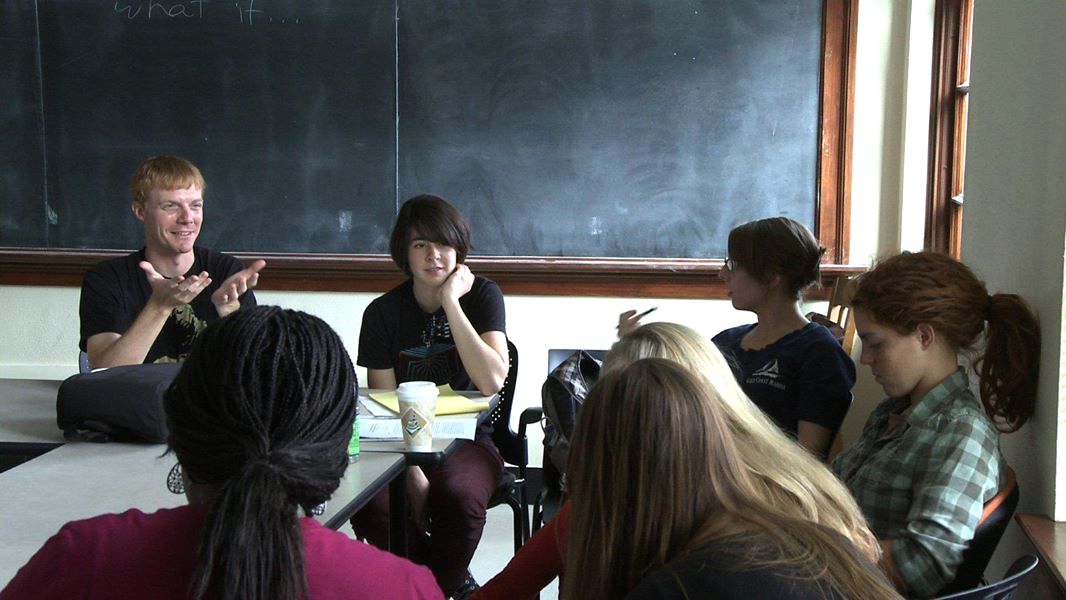Strange synchronicities abound lately, and this past week a few of them broke through the veil and showed themselves in all of their geeky glory. As Charles Eames once said, “Eventually everything connects.”
 Let me back up a bit first. A few months ago, it struck me that the cover art for Prefuse73’s Everything She Touched Turned Ampexian (Warp, 2009) looked like those of many old prog rock records, several of which I’d been listening to (e.g., Squawk by Budgie, Fragile by Yes, Asia’s self-titled debut, etc.).
Let me back up a bit first. A few months ago, it struck me that the cover art for Prefuse73’s Everything She Touched Turned Ampexian (Warp, 2009) looked like those of many old prog rock records, several of which I’d been listening to (e.g., Squawk by Budgie, Fragile by Yes, Asia’s self-titled debut, etc.).
A few months later, the trailer for Avatar played before every movie I went to see, and again, I was reminded of those old prog rock records. A little bit of research reveals that the Prefuse cover was done by Dan McPharlin (certainly no slouch himself), and the old prog records were done by Roger Dean. How Roger Dean isn’t getting paid for the scenery in Avatar, I do not know.

In the next few months, I soaked up all of those old records. In conjunction with my already recent propensity for prog, I had quite the list of listening. From my usual The Mars Volta, Porcupine Tree, Peter Gabriel, Rush, Voivod, and Pink Floyd, to going back for more King Crimson and Yes. The latter of which has had me occupied (read: obsessed) for the past few months. Not only are theirs the record covers I’d been thinking about when this all started (Roger Dean did most of them), but they have a long and tumultuous history to dig through.
Fast forward to last week when I headed up to Chicago to do a lecture at UIC, and Yes happens to be playing at the House of Blues on the Friday while I’m up there! In the meantime, my friend and colleague Mike Schandorf (he teaches the class I went to talk to) was trying to accommodate my vegetarian diet by taking me to places his veggie friends recommended. So, to top all of this off, the day before the show, we went to breakfast at The Chicago Diner, and who’s sitting there eating omelets but Steve Howe and Alan White, Yes’s guitarist and drummer respectively. What did I have for breakfast? Geeking-out, over-medium, and some wheat toast, I think.
The Yes show itself was geeky, nerdy, silly, and amazing all at the same time. I was skeptical, not only because well, those guys are getting up there in the years, but also because Jon Anderson wasn’t with them. I have to say, Benoit David, his replacement on vocals, was solid. David sounded like Anderson and, unlike previous “replacements” (e.g., Trevor Horn, which is not to dis Horn; see below), he was able to handle the material that required Anderson’s higher register without any problems. The only vocal problems evident were Chris Squire’s. While he’s probably one of the best and most distinctive bass players to ever pick the instrument up (see “Tempus Fugit” alone for enough evidence of this), his voice sounded strained, added nothing to the harmonies, and was way too high in the mix (Schandorf told me later that the House of Blues is notorious for bad sound). Like Squire, Steve Howe is a master of his instrument. Once he got warmed up, which took a couple of songs, he was the focal point of the show. His guitar work on songs like “Roundabout,” “Tempus Fugit,” “South Side of the Sky,” and “Yours is No Disgrace” was indisputable. Alan White held down the beats, and Rick Wakeman’s son Oliver played the keys: No complaints there.
The setlist was career-spanning and comprehensive, and aside from a few odd choices (e.g., “Onward” from Tormato and “Machine Messiah” from Drama) and a very few omissions (I wanted to hear “Leave It,” but maybe given the aforementioned vocal situation, it was better left out), I doubt anyone who was a fan left disappointed.

In the midst of enough of this sort of geeking-out and researching, one starts to see cycles and patterns. Digging through the history of Yes and seeing their less-celebrated Trevor Rabin and Trevor Horn era again (i.e., the 80s releases, Drama, 90125, Big Generator, etc.), and seeing that without Rabin and Horn’s work together, apart, in and out of Yes (for better or worse), we probably wouldn’t have bands like MGMT, Battles, or Animal Collective today. The Avatar connection makes it all just too uncanny (Seriously, I hope Roger Dean is talking to a lawyer; see below).
One of the underlying messages I took with me to UIC was that you should embrace your geekiness, follow your curiosity. Everything good comes from finding your passions and following them. The rest of that Charles Eames quotation goes, “Eventually everything connects — people, ideas, objects. The quality of the connections is the key to quality per se.” This is just me, attempting to follow those connections and practice what I preach. And, as Schandorf keeps reminding me, “Yours is no disgrace.”
———-
Here’s a short montage someone put together of Roger Dean paintings and scenes from Avatar [runtime: 1:18]

